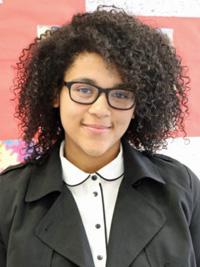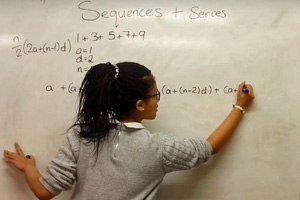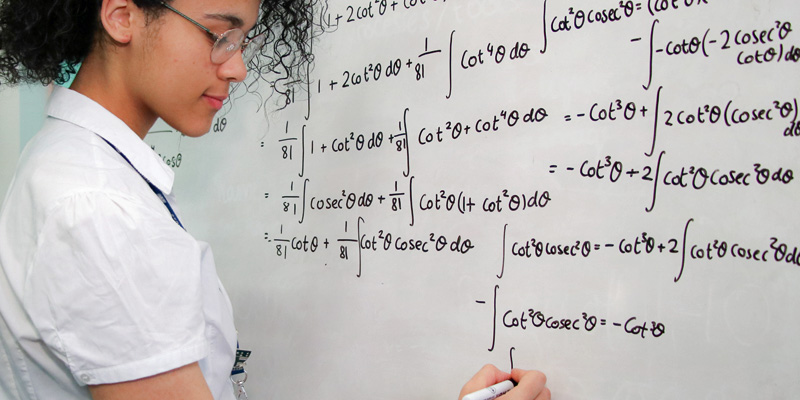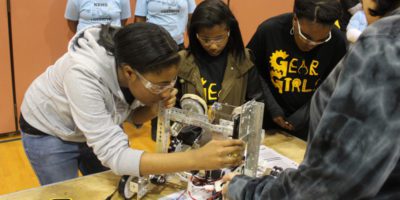Vanessa Madu is studying for her A-levels at Ursuline Academy in Ilford. She is passionate about science, technology, engineering and mathematics (STEM) and wants to help inspire other young people, particularly girls, to love STEM as well. In 2016, the IET invited a group of young people to join its new Junior Board in a ground-breaking move to tackle the engineering shortage by encouraging input and ideas from the potential engineers of tomorrow, and Vanessa is a member.

“…Having a passion for maths isn’t nearly as weird as you have probably been lead to believe … maths is not just for the boys who probably seem to dominate your classes, it’s not just for the people with enormous nerdy glasses and egos to match, it’s for you too and don’t ever let anyone convince you otherwise…”
Formal proof that I love maths

I’ve had a particular interest in STEM subjects for as long as I can remember really, right from when I would throw my dolls on the floor asking for the toy helicopter my brother had instead.
My passion for the sciences did get quietened ever so slightly in secondary school until my teachers got me involved in the National Science and Engineering Competition and I couldn’t help but have that passion reawakened just by being surrounded by that much practical science and engineering in one place. This is how my love for the sciences came about but my passion for maths came about in a rather different way.

I’d knitted it together using some of the simplest concepts, something elegant and complicated and quite frankly beautiful and realising that changed my view of maths completely. Fast forward a few years from then and I’m now studying maths, further maths, physics and chemistry (or as I like to call them: maths, maths, applied maths and applied applied maths) at A-level and I am currently really enjoying the depth of which I am being allowed to study these subjects.
Being offered a place to study mathematics at Trinity College, Cambridge

I’m absolutely thrilled to have an offer to study mathematics at Trinity College and I feel both honoured and humbled. I’ve got the opportunity to study maths alongside some of the best young minds in the world, in the same place as where Isaac Newton studied, which I think is awesome!
I also expect that in Cambridge, Trinity College especially, I will be in the best place for geeking out in interested company about the newest mathematical concept that I’ve come across, which I really look forward to!
The importance of saying “yes” to opportunities
Over the years, I have gotten involved in more STEM activities than I can count, from all of science, technology, engineering and maths, and this gave me a very broad perspective that I certainly wouldn’t have if I had not decided to say “yes” to so many different opportunities.
I remember quite distinctly the first big project that I got involved in, it was a project on sustainability that I had the privilege of being project manager for, which we ended up taking to the National Science and Engineering Competition. Little did I know this experience would be the first of many more.
Through the National Science and Engineering Competition, and with the help of my design and technology teachers, I met the Stemettes, which was my second and probably most impactful involvement with STEM. With the Stemettes, I was a part of the Outbox programme, where I worked on a technology start up. At the Outbox launch I had the opportunity to present to HRH Princess Anne and from there I have received a lot of support in my work in STEM, all of which I have learned some very valuable lessons from.
More recently, I have gotten involved with the British Science Association’s CREST Youth Panel and the Junior Board at the IET, where I have been given a platform to be an advocate for women in STEM.
Extracurricular activities – from shy girl to confident young woman
Extracurricular activities are very important when applying to university but not for the reason that I believe most people think. Teachers will encourage you to take part in extracurricular activities with the promise that it will make your UCAS application look great and help you to stand out from the other applicants, and whilst this is to some extent true, this is not the reason that I would sit here and encourage you to do the same.
I can definitely say that since I started participating in extracurricular activities, particularly academic ones, my confidence has increased exponentially, I went from the shy girl who hardly spoke to a young woman who is passionate, eloquent and confident. My ability to speak in front of people, to communicate what I am thinking and to explain the thought process behind it have all improved incredibly and those skills proved invaluable in university interviews.
As well as adding to my UCAS application, my extracurricular activities changed who I was as a person, making me someone who was far more prepared to apply to university because of the skills that I had gained.
All @TheIET Junior Board memb @Rachell_daii agree as @NessaMadu reiterates @florianexxxx funding concerns. 😊 @LeahSinclairr @ChristinaAstin pic.twitter.com/XSjKWnoPbW
— STEMStress (@STEMRussell) June 7, 2017
My role model: Katherine Johnson
I had a couple of role models in STEM growing up but one that I find to be truly incredible is Katherine Johnson, who was a mathematician who made amazing contributions to NASA’s aeronautics and space programmes, despite being an African-American woman in a time where discrimination was prominent.

She continued to peruse what she loved despite being disadvantaged and I have sought to do the same. Being aware of how important having a role model was for me, I want to make sure that I am a good role model for the next generation of young scientists, mathematicians and engineers.
I hope to through my work create things that will positively affect people, whether that be contributing new mathematics to the field of engineering like Katherine Johnson or through work in pure mathematics; whichever I chose, I want to make sure that I am a good role model for those who are around me.
Advice to other young women who are interested in maths
Here is my advice the young women out there who are like me and love maths more than they 1. Can describe 2. Believe is normal: Having a passion for maths isn’t nearly as weird as you have probably been lead to believe. I’d also like you to know that maths is not just for the boys who probably seem to dominate your classes, it’s not just for the people with enormous nerdy glasses and egos to match, it’s for you too and don’t ever let anyone convince you otherwise.
It is something so precious to be a young woman with a passion for mathematics, mostly because there are so few of us, you’d only need to walk into a maths lecture at pretty much any university to see that. So, rather than trying to hide your obsession for numbers or your adoration for geometry, embrace it.
In fact, to make it easier for you, I’ll start:
Hi! I’m Vanessa. The home screen picture on my phone is a graph of e^x against lnx. The only reason I use napkins in restaurants is to do maths on them and I have a slight obsession with numbers; so, in short, maths is my super power. What’s yours?
Career plans for the future
I do have to admit I am rather split as to my ambitions for the future. A career in academia dealing with the most abstract mathematical concepts seems oh so tempting at the minute but my inner engineer wants some practicality.
For a mathematician, mathematics is a beautiful and, dare I say, almost artistic science in itself that can rather elegantly describe almost anything the universe puts in front of it, as mathematics was the language in which the universe was written in the first place.
To an engineer, mathematics is something quite different, it is an extremely useful tool and without it, none of the most phenomenal feats in engineering would have been possible. Whichever side I do go on to choose I know that I want to have a part in developing mathematics in some way and that will be what I strive to do.
On the horizon

http://terminalvelociraptor.blogspot.co.uk/
Trinity College, Cambridge image credit: By Cmglee (Own work) [CC BY-SA 3.0 (https://creativecommons.org/licenses/by-sa/3.0) or GFDL (http://www.gnu.org/copyleft/fdl.html)], via Wikimedia Commons
Katherine Johnson image credit: By NASA/Sean Smith [Public domain], via Wikimedia Commons





